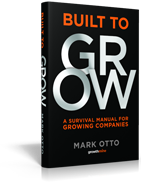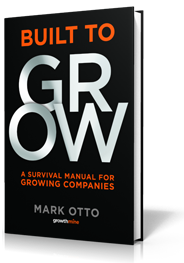
When It’s Time for a Business to Stand on Its Own

For a business to reach the highest levels of growth, profitability, and success, there must be a shift from dependence to independence. When a company is young, the founder is in total control, but as it grows and matures the self-interests of the founder can no longer trump the needs of the business. The organization needs sovereignty. The challenge is to forge the organization into a whole that is greater than the sum of its parts.
The founder must recognize that the business has become bigger than he is. It needs a life of its own. In the early stages, decision-making and the entrepreneurial spirit are personalized with the leader or leaders of the company. To move forward, decision-making and the entrepreneurial spirit must become institutionalized or systematized to allow the organization to act objectively, in the best interests of the business, independent of any individual.
Recognize the Need for Organizational Sovereignty
The same level of control that was applied by the founder in the early stages of the company’s growth will begin to suffocate it when it becomes more complex. All businesses are limited by the capabilities of its leaders. Intuitively, most founders know that they need help managing a bigger, more complex organization, but they have a difficult time changing their style to fit the new reality.
As a company grows, the founder can no longer carry the responsibilities of CEO and sales manager, product developer, marketer, and bill collector. There just aren’t enough hours in the day to manage everything alone. As a business gets bigger, the founder must learn to delegate and decentralize authority without giving up all control.
Let Go Without Losing Control
As a company grows, it is essential that the founder move away from a Lone Ranger style of management. At a certain point, the business will outgrow the founder’s ability to manage it alone. Founders must learn to share power by delegating authority without giving up total control or becoming a progressively larger obstacle to the organization’s development. To make the successful transition from a small business to a larger one, founders must put the needs of the organization above their own egos. The founder must allow the organization to stand on its own.
It’s hard for hands-on leaders, particularly those that have built the company from the ground up, to let go of day-to-day decision making. But they must let go and move into a more strategic role to help lead the company to the next level of growth. This new focus will require more leading and less doing. The founder needs to become a strategist, communicator, coach, and team builder.
Stop Being Chief of Answers
In the earlier stages, the founder had all the vision, ideas, and answers. In large part, the creativity of the founder drove the growth. But when a business becomes more complex, the founder must admit that she no longer has all the answers and that more and sometimes better answers will come from others. Synergy comes from having many people aggressively searching for new opportunities to achieve the shared vision.
Delegate
Delegation is how knowledge and thinking is transferred from the founder to the rest of the organization. Young companies have huge unrealized potential because they have not yet delegated decision-making authority. Top down decision making was appropriate and necessary in the early stages of growth, but eventually that level of control will stifle the growth and development of the organization.
Delegating can be difficult because it requires a transfer of knowledge and thinking to other people. Even though it seems much easier – and definitely quicker – for the founder to make decisions himself, it is critical that time is taken to give direction and transfer knowledge. This enables the founder’s vision and leadership to be transferred to the organization.
Early on, the founder is the glue that holds everything together. But as a business becomes more complex things begin to fall apart because the founder can’t keep it all together. The organization needs to develop its own form of glue so that it is no longer dependent on the founder for success.
Is it time for you to let go?





